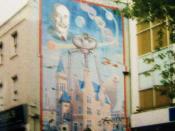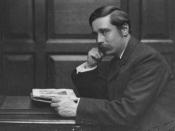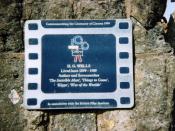The remarkable idea of "The Time Machine" was the original inspiration of British science-fiction writer, H.G. Wells, who devoted his works mainly in scientific literatures. "The Time Machine" has proven to be a classic for its originality, deeper meaning of different society and adaptation into different media over the centuries. Being referred as "the father of science fiction", H.G. Wells has accomplished many of science fictions including "The Time Machine" during his early ages. "The Time Machine implies a complex and deep meaning of utopian society, which Wells has created. Because of its insightful meanings, huge number of reader around the world read it then it has been imitated from other different media, such as movie and the concept of time traveling is being studied from various science fields in an attempt to create a revolutionary machine.
Wells' originality in science fiction can be found in the Christopher Isherwoods critiques.
In his biographical essay, he argues that "H.G. Wells is best known as one of the progenitors of modern science fiction". (cite) He describes briefly about Wells' "pioneering works in this genre foretold such developments as chemical warfare, atomic weapons and world wars". (cite) Wells first started his career with the novel "The Time Machine", which was hailed as a work of genius and he has successfully gained popularity with series of different scientific romances. A Study of the Scientific Romances, argued to great effect that "The Time Machine" deserved to be ranked among the classics of the English languages. (cite) This is remarkable argument, because the prominent reason for being in rank of classic is that it implies the deeper meaning of utopian or meta-utopian society.
One of the strong reasons that readers continues to read "The Time Machine" over the centuries is because the novel contains the deep and insightful ideas of utopia. Wells was a major propagandist for utopian ideas who never produced a major utopian book. (cite) However, in "The Time Machine", it shows a generate future for humanity. In the novel, "the intellectual capacity of the utopians is reflected in unimaginable achievements in science and in the arts". (cite) They communicate by means of telepathic mind speech. "These utopians are the natural descendents of the intellectual aristocracy, the 'fine Olympians whom Wells saw as the highest products of the civilization of the English country-house". (cite) The first impression of the new society through the Time Traveler's eyes was very different from the modern society. Wells is trying to emphasize the social satire in chapter 5, which takes up the one third of the novel. "Under new conditions of perfect comfort and security, that restless energy, that with us is strength, would become weakness". (P.g 47) This quote emphasizes more of the utopia, which cannot be the same in modern society. Bernard argued that "when Wells looked into the future, he alternated between extremes of optimism and pessimism...there is the unutterable sadness of the Time traveler's last glimpse of the dying world". At this point, it becomes ironic when judging whether the novel is a utopia or a distopia. However, this confusion can contribute to the broad range of judgments and imagination, which should be the reason why "The Time Machine" is thoughtful and remained to be thought of throughout the centuries.
The idea of time traveling has been imitated by other media, such as an adaptation to movie and real attempts from various science fields to create a real "Time Machine". The first adaptation to movie was conducted by George Pal, who released movie version of "The Time Machine" in 1969. (cite) The second adaptation was taken by the director Simon Wells on his great-grandfather's novel in year 2002. (cite) "The Time Machine" is a truly visionary work not just by a literary classic but a profound commentary on the nature of humankind and the possibilities of science. (cite) Throughout the history, philosophers, writers, scientists and thinkers have speculated on the future of mankind. Would the future liberate or enslave real society? Would advances in technology save or destroy civilization? It was the search for these answers that spawned people's fascination with time travel, a fascination that has endured as long as civilization itself.



Nice summary
this is a nice summary, even though it would've been nice to incorporate the work that are described by many scients, such as Hawkins; who describes the possibility of an actual time machine
2 out of 2 people found this comment useful.